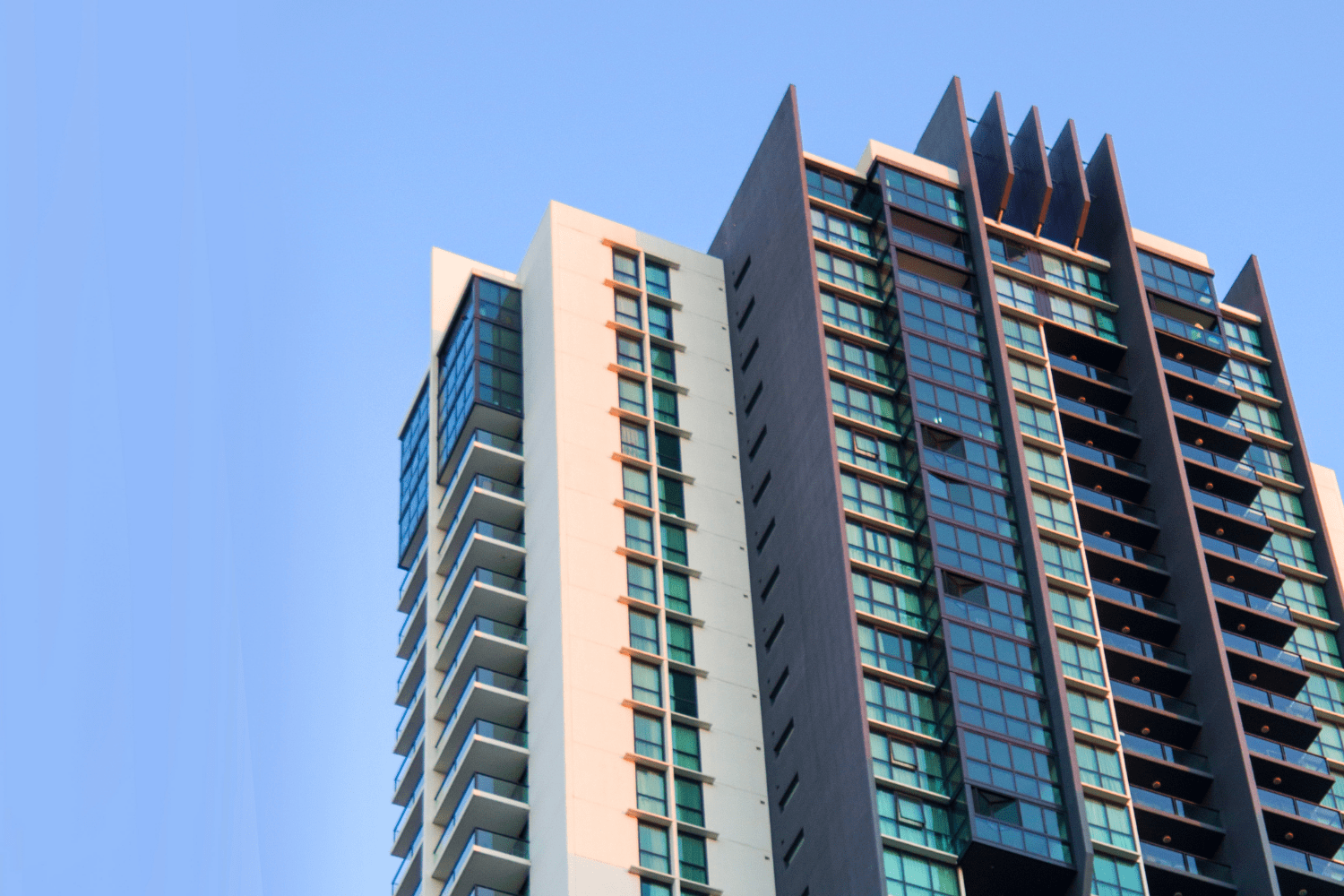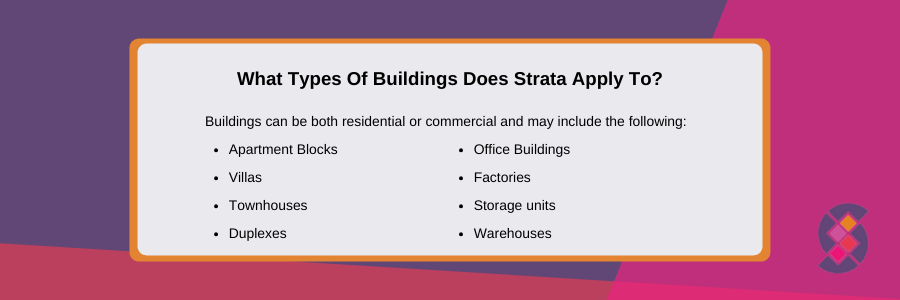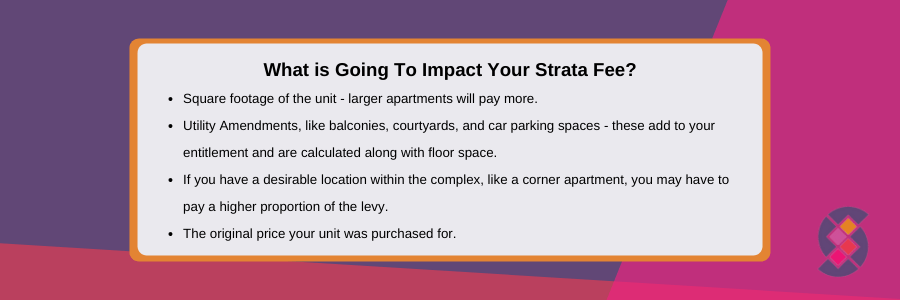What Are Strata Fees & What’s Included?

If you have been considering getting into the property market by purchasing an apartment or townhouse, its vital that you understand the fees and obligations associated with strata property ownership.
So, what are strata fees? And what is included in strata fees? Read on for our break down of some of the key factors influencing strata costs and what you need to be aware of when considering buying into a strata building.
Let’s start with the basics.
What is a Strata Scheme?
A strata scheme encompasses multi-unit properties that have multiple owners. When joining a strata scheme, each joint owner becomes mutually responsible for the management and upkeep of the building as a whole. When you purchase an apartment within a development, you automatically join this legal entity that entails specific responsibilities for general care and maintenance of the complex. This entity typically takes the form of a body called a Body Corporate.
Buying into a strata scheme essentially means owning the single lot whilst also taking on the responsibilities involved in the shared areas of the building or collection of buildings.
What Are Strata Fees?
As part of this mutual responsibility to maintain the common areas of your property, strata fees exist to ensure each tenant is ensuring their commitment to upholding the property’s condition. Strata laws vary in their requirements between states, but typically, in South Australia these fees are collected quarterly. They are payments made to the Body Corporate to ensure the upkeep of the communal areas of the property.

What Do Strata Fees Cover?
So, what is included in strata fees? Well, the total strata fee paid for by the owner includes finances that support the following:
- Common area maintenance
- Entire property maintenance
- Cleaners
- Strata management fees
- Utilities for the property’s common areas (Electricity to run elevators or lighting)
- Insurance for the building
What Are the Types of Strata Fees?
When you contribute to strata fees, these funds are paid directly to the Body Corporate. These fees come under one of three categories:
1. Administrative Fund Levies
Administrative fund levies are the general expenses for the property. This covers cleaning and gardening costs, shared utility bills, insurance for the Body Corporate, and any general upkeep or repairs that need to be made on the property’s common areas.
2. Sinking Fund Levies
These are collected for the capital works of the property. These fees go towards items that do not occur annually such as repainting the common areas, roof replacement or lift replacement.
3. Special Levies
Where a shortfall of funds exist in either the Administrative Fund or the Sinking Fund, a Special Levy (separate to the Quarterly Levies) can be raised to provide funds.
How Are Strata Fees Determined?
Strata fees vary from state to state and within each strata system. The recurrent expenses habitually differ from complex to complex and need to be agreed upon by the Members. Some properties have lighting in common areas as a recurrent expense, and others do not.
The most common factors that impact the level of strata fees are age, location, type of property, amenities, and more. There are often more premium amenities within some strata schemes that significantly affect the strata fees, such as pools, gyms, tennis courts, and more. Insurance costs tend to be one of the most significant expense for strata, especially within a building with multiple insurance claims.
Older buildings also tend to have higher costs, dictated by the need for more frequent repairs. On the other hand, newer buildings may not have as much maintenance required but often have more infrastructure and amenities to keep up with.
The strata scheme you buy into may also have been in the past subject to legal action or owners who have not paid their levies. Consequently, your strata fees may be impacted, as funds may be low.
Poor upkeep of the property may impact how much you pay in strata fees. If your committee has effectively managed the budget well and been in control of preventative maintenance for the property, then costs will be controlled and are unlikely to balloon. However, if these costs have been neglected and left to chance these can get out of control leading to an increase in fees.

How Are Strata Fees Calculated?
Now that you’ve got the answer to, “What are strata fees?”, the next step is working out how they are calculated.
Strata fees are decided by the body corporate at their Annual General Meeting (AGM). The members determine the amount that the owners need to pay after diligent reviewing of a budget put together by the Body Corporate’s Manager or Committee. This budget must show the current financial situation of the strata scheme and any estimates of payments that are to be made and received between that AGM and the next. The budget must be distributed to the members alongside the notice of the AGM and discussed at the meeting before being put to a vote. Then, the motions put forward by the group to set the strata fees must be approved by a majority vote of the members.
Why Are My Strata Fees Higher Than My Neighbours?
Each lot within a property has fees dictated by the entitlement set out in the strata plan when the unit was purchased. This unit entitlement system determines the total proportion of ownership you as a unit holder carries within the property as a whole, including within the common areas. Generally speaking, the larger the lot, the more you pay, as this entitlement is often dictated by market value.
How Often Do I Have to Pay Strata Fees?
Like the nature of the response to what do strata fees cover, their payment frequency also varies from scheme to scheme. They tend to be paid quarterly, but some schemes may have special legislation in place to dictate an alternative arrangement.
Are Strata Fees Tax Deductible?
If you are an investor, then your strata fees should be tax-deductible! You will need to keep a clear and concise record of any expenses incurred in your property for the ATO to be able to define which costs would be accepted as a deduction. To guarantee what can be claimed for tax purposes, ensure that you document all expenses and check these with an accountant or tax professional.
Why Choose Strata Data?
Strata Data are the award-winning Adelaide strata management company that helps over 1200 corporations and 11000 owners receive vital assistance in properly managing their strata schemes.
Strata Data is here to answer all questions, from the most basic, “what are strata fees?”, up to more comprehensive responses including the varied obligations unit holders have depending on the nature of their unit. Investing in strata management will result in savings for any Body Corporate as costs can rise dramatically without effective management.
Let us take the stress away from strata management and leave your corporation in safe hands. Phone us on 08 8372 2787 or fill out the form here for a free proposal.



